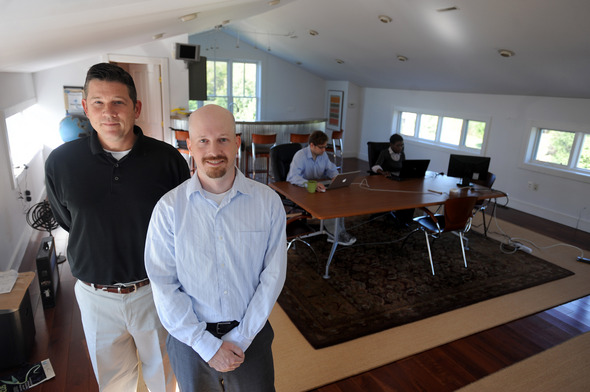MedHub's 'accidental' growth moves Web company from U-M roots to international realm

MedHub co-founders Peter Orr, left, and Thomas May pose inside the MedHub offices, which are in Orr's Scio Township home. The company is looking for its first 'real' office.
Angela J. Cesere | AnnArbor.com
MedHub has been around since 2002, when Orr and Thomas May began working on web development projects together - making "beer money," May said. They broke into the health care sector by working on a project for the University of Michigan that morphed into the company's first major contract.
"We never set out to do this," Orr said. By "this," Orr is referring to an 8-year-old information technology company that services several of the nation's leading teaching hospitals with a web-based information management system — and perhaps the only such company to have a llama outside its office at Orr's farm.
MedHub's system helps teaching institutions process Medicare reimbursements for the training of residency programs. MedHub has more than 100,000 users in its system, who annually log 1 million time sheets and 1.5 million evaluations. The company's 24 clients account for more than $1 billion in Medicare reimbursement.
MedHub has grown at a rapid pace this year, signing several new hospitals en route to its lofty goal. "We want to get as many of the (top-100) teaching hospitals as we can get," Orr said.
MedHub's latest client is the University of Wisconsin. "We're huge in the Big Ten," Orr said. "We have five Big Ten schools now."
Neither Orr nor May, though, expected MedHub to expand beyond its Big Ten roots at U-M. They were almost surprised to add a second client —Â Carolina Health System —Â in 2004.
But MedHub's work has proved worth whatever risk it took to sign on with an unproven company, said Susan Wade, assistant vice president of education and research for Carolina Health System.
"From the beginning, Tom and Peter have asked (us) to develop and prioritize an enhancements list of our own that we submit," Wade said. "Then they develop ways to make the changes we have asked for. Each new upgrade has been well thought out and builds on the base product.
"The ability to produce financial reports directly from MedHub has been very beneficial and saved us money in terms of personnel and efficiency."
MedHub has had to adapt through the years, not only to client specifications but also to keep pace with requirements of the Accreditation Council of Graduate Medical Education.
"At the very beginning, our system really focused on solving the immediate needs of resident education management," May said. "Since then, we've expanded to meet the needs of not just the residency programs, but other kinds of tasks. We now track information around faculty members, and we've also started expanding into medical schools.
"Now, students are on the same schedules as residents and faculty members. We can get the full (view). We're starting to become the source of all schedule information for those hospitals."
MedHub recently added its first international client, Hamad Medical Corp. in Doha, Qatar. Much like everything else the company has done, MedHub's relationship with a Middle Eastern health system came unexpectedly.
"There are things that come out and blindside us, like we just sold to the biggest hospital in the Middle East," Orr said. "We didn't think our system was viable outside of North America, just like we didn't know if our system was viable outside the University of Michigan."
Because Orr and May entered the business late, they thought their best-case scenario was to fight for about 30 percent of the market share. Instead, they've found health systems that chose information technology systems early on are now open to reevaluating those decisions.
"What we've found out with our last six contracts is all these institutions were looking for 'a' system at first, and now they're looking for 'the' system," Orr said.
MedHub's growth likely means it will soon leave behind its only home —Â the Orr family farm. The company plans to hire its fifth employee —Â a web developer —Â by the end of the year, and has begun looking for new office space in Ann Arbor.
"We're definitely in a growth pattern for hiring employees and expanding office space," Orr said. "As we grow, we're gonna have to spread out and hire more people."
Does that mean MedHub will discard its casual roots and go corporate? Not likely, Orr said.
"We've been looking for something like this —Â interesting and eclectic," he said. "We probably won't be in a 20-story building with cubicles. We'll need a little land.
"And maybe a pet or two."


Comments
Townie
Sun, Oct 10, 2010 : 3:56 p.m.
So is this office legal and allowed by zoning and the neighbors? Are the fire and other ordinances met?
seldon
Sun, Oct 10, 2010 : 9:55 a.m.
"perhaps the only such company to have a llama outside its office at Orr's farm." I'm reasonably confident that it's the only such company to have a llama outside its office at Orr's farm. Why would he let any of his competitors have an office at his farm?